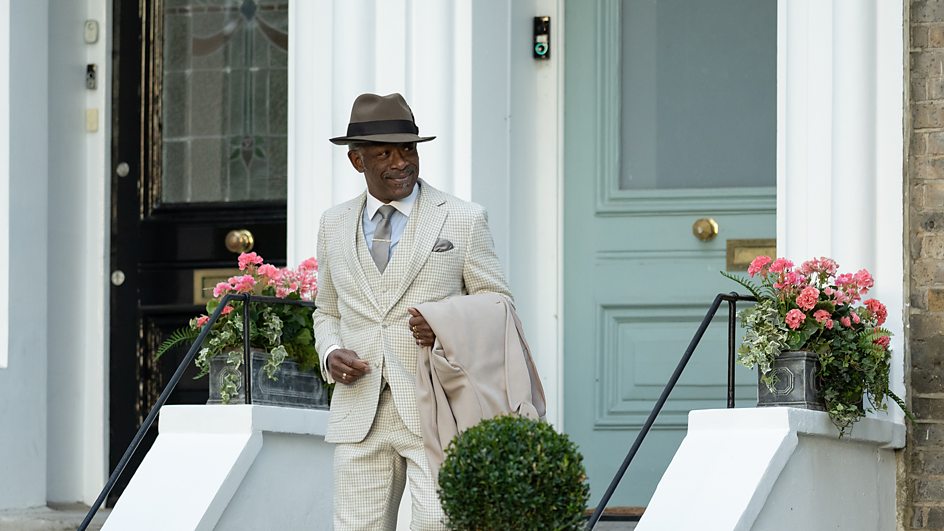Mr Loverman: 'wonderfully complex' show starring Lennie James
TV adaptation of Bernardine Evaristo's novel tells the story of a gay septuagenarian contemplating leaving his wife for his lifelong best friend

A free daily email with the biggest news stories of the day – and the best features from TheWeek.com
You are now subscribed
Your newsletter sign-up was successful
"It's hard to think of a better casting choice than the great Lennie James" as Barrington Walker in BBC One's adaptation of Bernardine Evaristo's 2013 novel "Mr Loverman". "You can't visualise anyone else" as the "dapper, roguish" septuagenarian, driving around in his "gleaming Daimler".
He's been married to the "God-fearing" Carmel for half a century but their marriage is clearly "under strain". Carmel is "fed up" with her husband's antics; he regularly stays out late drinking and ends up "rolling home" in the early hours, said Pat Stacy in the Irish Independent.
It turns out Barry has been the "secret lover" and "soulmate" of his best friend, Morris, since their boyhood in Antigua, said Lucy Mangan in The Guardian. This is the story of a "good life built on lies"; their happiness is "almost palpable" when on screen together, but the "50 misspent years are tragic and their effects corrosive".
The Week
Escape your echo chamber. Get the facts behind the news, plus analysis from multiple perspectives.

Sign up for The Week's Free Newsletters
From our morning news briefing to a weekly Good News Newsletter, get the best of The Week delivered directly to your inbox.
From our morning news briefing to a weekly Good News Newsletter, get the best of The Week delivered directly to your inbox.
As he faces up to old age, Barry "knows time is running out and regrets are rushing in". He promises Morris that he is finally ready to leave Carmel but his lover looks at him with "weary tenderness" – they have "been here before" many times.
Despite its painful examination of the community's deep-rooted homophobia, this is no "miseryfest". "There is plenty of light as well as shade", much of which is provided by Barry and Carmel's "high-maintenance drama queen" younger daughter Maxine (Tamara Lawrance).
"I didn't really get on with it in the beginning", said Anita Singh in The Telegraph. The opening episode "screams 'adapted from a book'" – it felt as if writer Nathaniel Price was "so reverential" to Evaristo's novel that he had "thrown in" every one of the Booker prize-winning author's lines rather than having the "confidence to pare it down". The show takes the characters' "innermost thoughts" from the page and translates them into a voiceover that "clutters" each scene.
But I'm glad I "persevered". The narration gradually becomes "less obtrusive and the characters more appealing". Throughout the series, there are flashbacks to Barry's early relationship with Morris in Antigua but it's the present-day scenes of his life in east London "with their exploration of love and longing in old age" that are "the strongest".
A free daily email with the biggest news stories of the day – and the best features from TheWeek.com
Evaristo's "clever, sparky novel is relatively short", added Carol Midgley in The Times, and as the action is "stretched" across eight episodes it can make the series feel at times like it's moving at a "glacial pace". Even if you sometimes wish things would "speed up a bit", though, James is "layered and twinkling" as Barry, and Sharon D. Clarke gives a "stand-out performance" as the long-suffering Carmel, wearing the "disappointment, hurt and rage" of spending most of her life with a husband she knows is cheating in "every movement of her body". The final scenes when Barry and Carmel are "pulling at the entrails of their rotted marriage" are "easily the best".
All in all, "Mr Loverman" is a "wonderfully complex" show that threads together issues spanning everything from sexuality and racism to marital breakdown and infidelity, said Jeff Ingold on the i news site. It's "rare and powerful to see two elderly Black gay men on-screen in love – and having sex", and the series should be "celebrated" as part of the "changing cultural tide" bringing these stories to the mainstream.
Irenie Forshaw is the features editor at The Week, covering arts, culture and travel. She began her career in journalism at Leeds University, where she wrote for the student newspaper, The Gryphon, before working at The Guardian and The New Statesman Group. Irenie then became a senior writer at Elite Traveler, where she oversaw The Experts column.
-
 Will increasing tensions with Iran boil over into war?
Will increasing tensions with Iran boil over into war?Today’s Big Question President Donald Trump has recently been threatening the country
-
 Corruption: The spy sheikh and the president
Corruption: The spy sheikh and the presidentFeature Trump is at the center of another scandal
-
 Putin’s shadow war
Putin’s shadow warFeature The Kremlin is waging a campaign of sabotage and subversion against Ukraine’s allies in the West
-
 The year’s ‘it’ vegetable is a versatile, economical wonder
The year’s ‘it’ vegetable is a versatile, economical wonderthe week recommends How to think about thinking about cabbage
-
 The biggest box office flops of the 21st century
The biggest box office flops of the 21st centuryin depth Unnecessary remakes and turgid, expensive CGI-fests highlight this list of these most notorious box-office losers
-
 Mail incoming: 9 well-made products to jazz up your letters and cards
Mail incoming: 9 well-made products to jazz up your letters and cardsThe Week Recommends Get the write stuff
-
 The 8 best superhero movies of all time
The 8 best superhero movies of all timethe week recommends A genre that now dominates studio filmmaking once struggled to get anyone to take it seriously
-
 One great cookbook: Joshua McFadden’s ‘Six Seasons of Pasta’
One great cookbook: Joshua McFadden’s ‘Six Seasons of Pasta’the week recommends The pasta you know and love. But ever so much better.
-
 How to navigate dating apps to find ‘the one’
How to navigate dating apps to find ‘the one’The Week Recommends Put an end to endless swiping and make real romantic connections
-
 February TV brings the debut of an adult animated series, the latest batch of ‘Bridgerton’ and the return of an aughts sitcom
February TV brings the debut of an adult animated series, the latest batch of ‘Bridgerton’ and the return of an aughts sitcomthe week recommends An animated lawyers show, a post-apocalyptic family reunion and a revival of a hospital comedy classic
-
 Caribbean resorts that call for serious rest and relaxation
Caribbean resorts that call for serious rest and relaxationThe Week Recommends Serenity is a flight away